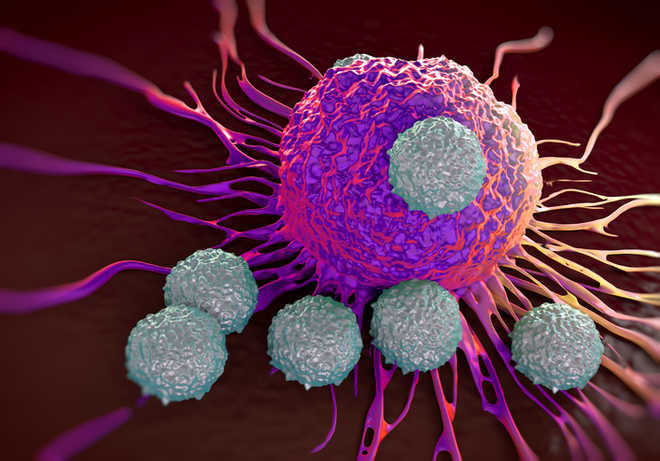
Photo source: Thinkstock
Washington
Circular DNA, once thought to be rare in tumor cells, is actually very common and seems to play a fundamental role in evolution and drug resistance of cancer, scientists including one of Indian origin have found.
The new study is likely to change the way tumor evolution is understood by scientists and could ultimately lead to new ways to prevent and treat many malignancies.
Circular DNA that encode cancer genes are far more common in cancer cells than previously believed and may play a central role in generating the cellular diversity that makes advanced cancers so difficult to treat, researchers said.
In their study, an team led by Paul Mischel from Ludwig San Diego and Vineet Bafna of the University of California San Diego in the US analysed cells from 17 different types of cancer to explore extrachromosomal DNA (ecDNA), which is so named because it is unassociated with chromosomes.
They report that ecDNA is a key feature in nearly half of all types of tumors and show that it encodes multiple copies of cancer-driving genes.
The researchers also show that ecDNA plays a far bigger role in the growth, diversity and drug resistance of cancer cells than the same genes housed on chromosomes in such tumors.
"We have discovered something fundamental about how cancers diversify and evolve. This is an essential rethinking about what goes wrong with genes in cancer," said Mischel.
Researchers integrated several different technologies, including genomics, bioinformatics and classical cytogenetics, to detect, quantify, and analyse ecDNA.
They found ecDNA in 40 per cent of tumor cell lines but extremely rarely in normal cells. When they looked specifically at patient-derived models of brain tumors, nearly 90 per cent of these carried ecDNA.
The researchers found that cancer-fueling genes, or oncogenes, are more likely to occur on ecDNA than on chromosomes.
They then quantitatively modeled these findings and verified their model's predictions through experiments conducted on tumor samples from patients.
These studies showed that tumors are more diverse — or heterogeneous — when oncogenes are amplified on ecDNA instead of on chromosomes, enabling them to more rapidly achieve and maintain high levels of cancer promoting genes.
Unlike chromosomes, ecDNA is parceled out randomly to daughter cells when a tumor cell divides.
So any given cell in a tumor might have no ecDNA in its nucleus or be crammed to the proverbial gills with the stuff — and the greater the variation in their number, the greater the heterogeneity of cells in a tumor.
It is this cellular diversity that makes tumors far more resistant to environmental challenges, most notably drug therapy.
The study was published in the journal Nature. — PTI



























